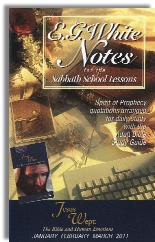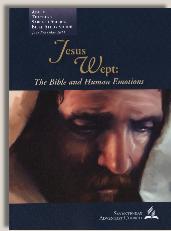|
||||||||||||||
Commentary on "Emotions"
Day 7: Friday, December 31, 2010 - Further Study
Overview
Today’s lesson is a passage from Ellen White’s Spirit of Prophecy, vol 3, pp 23, 24, in which she describes Jesus’ second cleansing of the temple. She describes Him, the people, and the circumstances with details not suggested in the Bible. The lesson ends with four questions. The first asks how we can describe and what we learn from “the emotions of Jesus as expressed in the above passage.”
The last question is, “How can we learn to cling to God’s promises when, for now, they seem so distant and unattainable?”
Observations
This lesson depends entirely upon the words of an extra-biblical prophetess. Truth, however, is not found in anyone’s ideas; truth is in God’s own word. The Bible does not describe this second temple cleansing with the fanciful details used in this passage of EGW. Below is the passage from the Bible:
The Passover of the Jews was at hand, and Jesus went up to Jerusalem. In the temple he found those who were selling oxen and sheep and pigeons, and the money-changers sitting there. And making a whip of cords, he drove them all out of the temple, with the sheep and oxen. And he poured out the coins of the money-changers and overturned their tables. And he told those who sold the pigeons, “Take these things away; do not make my Father's house a house of trade.” His disciples remembered that it was written, “Zeal for your house will consume me.”
So the Jews said to him, “What sign do you show us for doing these things?” Jesus answered them, “Destroy this temple, and in three days I will raise it up.” The Jews then said, “It has taken forty-six years to build this temple, and will you raise it up in three days?” But he was speaking about the temple of his body. When therefore he was raised from the dead, his disciples remembered that he had said this, and they believed the Scripture and the word that Jesus had spoken. (John 2:13-22 ESV)
This passage is about Jesus’ authority and His honor for His Father’s house, not about Jesus’ emotions. The passage does not describe any sort of mesmerized swaying on the part of the people.
Finally, the fourth question is revealing. It asks how to cling to God’s promises when they are, for now, distant and unattainable. For a person to ask this question, he cannot be experiencing the new life of being born again.
First, God’s promises are not distant nor unattainable now. 2 Corinthians 1:19-20 tell us:
For the Son of God, Jesus Christ, whom we proclaimed among you, Silvanus and Timothy and I, was not Yes and No, but in him it is always Yes. For all the promises of God find their Yes in him. That is why it is through him that we utter our Amen to God for his glory.
All God’s promises are Yes in Christ, and that reality begins for us when we place our faith in the Lord Jesus. Eternal life becomes ours at that moment, and we pass from death to life (John 4:25). We are assured that we are God’s children and heirs (Rom. 8:14-17).
When we are born again, we have true peace that is different from the “peace” of the world (John 14:27). We have the fruit of the Spirit (Gal. 5:22-23); love, joy, peace, patience, kindness, goodness, faithfulness, gentleness, self-control. These are promises for NOW.
Because of Jesus, we have complete reconciliation with the Father when we place our faith in Him and are credited with His personal righteousness (Rom, 3:21-26; Col 1:20). Moreover, He promises to complete the work He began in us; we do not complete it ourselves (Phil 1:6).
God does not promise to relieve us of all difficulty and pain, but He does promise that His strength is made perfect in our weakness (2 Cor. 12:8-9).
When we place our faith in Jesus, we are ushered into the new covenant (Heb. 8), and we have complete access to the Father.
Conclusion
- Jesus’ cleansing of the temple is about His authority and reverence for God, not about how to properly express emotions.
- God’s promises are not distant and unattainable now; they are ours the moment we are born again because Jesus has accomplished them for us, and the Holy Spirit makes them real in our lives.
- When we belong to Jesus, all God’s promises are “Yes!” for us in Him.
Copyright 2010 BibleStudiesForAdventists.com. All rights reserved. Revised December 28, 2010. This website is published by Life Assurance Ministries, Glendale, Arizona, USA, the publisher of Proclamation! Magazine. Contact email: BibleStudiesForAdventists@gmail.com.
The Sabbath School Bible Study Guide and the corresponding E.G. White Notes are published by Pacific Press Publishing Association, which is owned and operated by the Seventh-day Adventist church. The current quarter's editions are pictured above.
Official Adventist Resources
Standard Edition Study Guide Week 1
Teacher's Edition Study Guide Week 1
Easy Reading Edition Study Guide Wk 1
Search the Complete Published Ellen G. White Writings


